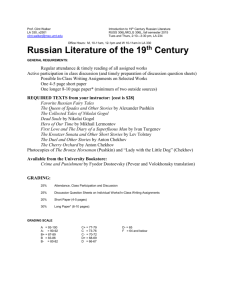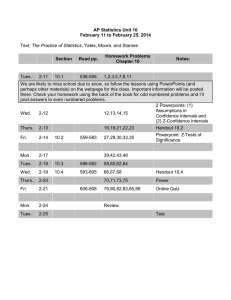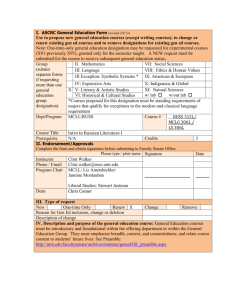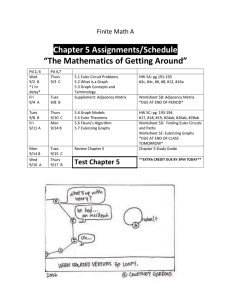I. ASCRC General Education Form Group V Literary and Artistic Studies Dept/Program
advertisement
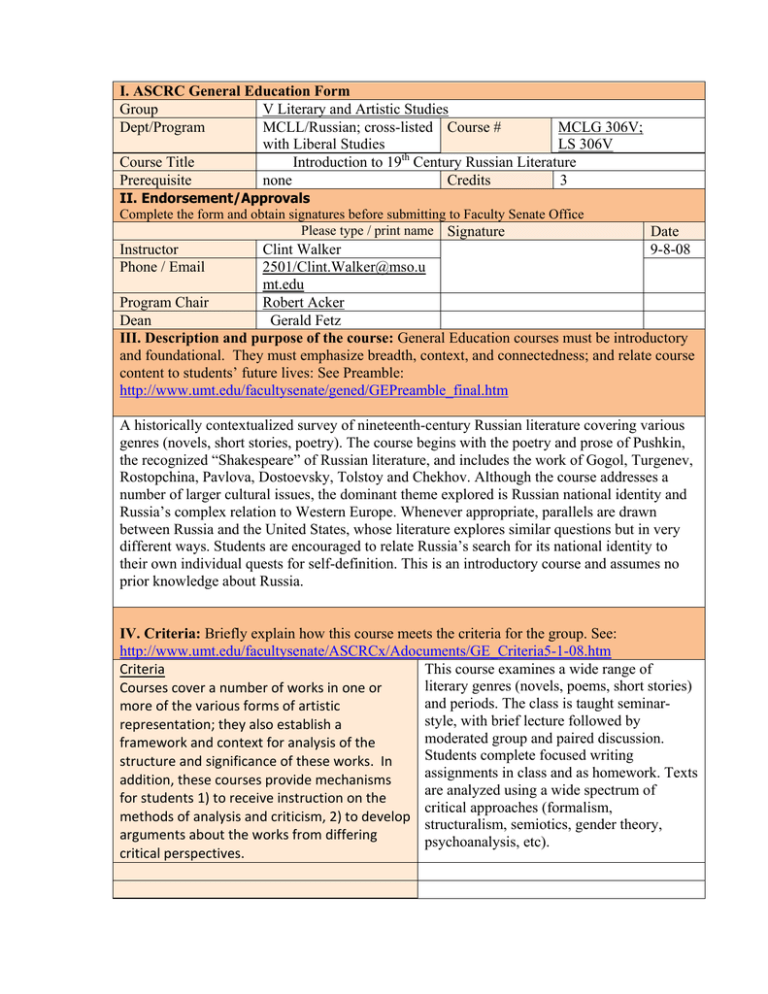
I. ASCRC General Education Form Group V Literary and Artistic Studies Dept/Program MCLL/Russian; cross-listed Course # MCLG 306V; with Liberal Studies LS 306V Course Title Introduction to 19th Century Russian Literature Prerequisite none Credits 3 II. Endorsement/Approvals Complete the form and obtain signatures before submitting to Faculty Senate Office Please type / print name Signature Date Clint Walker 9-8-08 2501/Clint.Walker@mso.u mt.edu Program Chair Robert Acker Dean Gerald Fetz III. Description and purpose of the course: General Education courses must be introductory and foundational. They must emphasize breadth, context, and connectedness; and relate course content to students’ future lives: See Preamble: http://www.umt.edu/facultysenate/gened/GEPreamble_final.htm Instructor Phone / Email A historically contextualized survey of nineteenth-century Russian literature covering various genres (novels, short stories, poetry). The course begins with the poetry and prose of Pushkin, the recognized “Shakespeare” of Russian literature, and includes the work of Gogol, Turgenev, Rostopchina, Pavlova, Dostoevsky, Tolstoy and Chekhov. Although the course addresses a number of larger cultural issues, the dominant theme explored is Russian national identity and Russia’s complex relation to Western Europe. Whenever appropriate, parallels are drawn between Russia and the United States, whose literature еxplores similar questions but in very different ways. Students are encouraged to relate Russia’s search for its national identity to their own individual quests for self-definition. This is an introductory course and assumes no prior knowledge about Russia. IV. Criteria: Briefly explain how this course meets the criteria for the group. See: http://www.umt.edu/facultysenate/ASCRCx/Adocuments/GE_Criteria5-1-08.htm This course examines a wide range of Criteria literary genres (novels, poems, short stories) Courses cover a number of works in one or and periods. The class is taught seminarmore of the various forms of artistic style, with brief lecture followed by representation; they also establish a moderated group and paired discussion. framework and context for analysis of the Students complete focused writing structure and significance of these works. In assignments in class and as homework. Texts addition, these courses provide mechanisms are analyzed using a wide spectrum of for students 1) to receive instruction on the critical approaches (formalism, methods of analysis and criticism, 2) to develop structuralism, semiotics, gender theory, arguments about the works from differing psychoanalysis, etc). critical perspectives. V. Student Learning Goals: Briefly explain how this course will meet the applicable learning goals. See: http://www.umt.edu/facultysenate/ASCRCx/Adocuments/GE_Criteria5-1-08.htm Students analyze works in a number of Learning goals Upon completion of this perspective, students literary periods (sentimentalism, romanticism, realism, nascent modernism) will be able to: using a wide range of critical approaches, 1. analyze works of art with respect to from formalism and semiotics to structure and significance within literary deconstruction and gender studies. and artistic traditions, including emergent Particular emphasis is placed on reading the movements and forms; and text in its historical and cultural context in order to develop and support arguments 2. develop coherent arguments that critique more convincingly. these works from a variety of approaches, such as historical, aesthetic, cultural, psychological, political, and philosophical. VII. Syllabus: Paste syllabus below or attach and send digital copy with form. ⇓ The syllabus should clearly describe how the above criteria are satisfied. For assistance on syllabus preparation see: http://teaching.berkeley.edu/bgd/syllabus.html Prof. Clint Walker LA 330, x2501 clint.walker@mso.umt.edu Office Hours: M, T, W 11-12, LA330 Introduction to 19th Century Russian Literature MCLG 306V/RUSS 306V, spring semester Tues and Thurs, 2:10-3:30pm, LA 234 19th Century Russian Literature GENERAL REQUIREMENTS: Regular attendance and timely reading of all assigned works. Active participation in class discussion. Two-three in-class response papers (1/2-1 page, handwritten) One 4-6 page short paper Midterm One longer 8-10 page research paper* (minimum of two outside sources, at least one of which is not web-based) Final exam. REQUIRED TEXTS: Available from your instructor: Saint Petersburg: Places and History (White Star Publishers, 2002). Cost: $5.25 “The Queen of Spades” by Alexander Pushkin, poems (packet). Cost: $.75 Available in the bookstore: The Portable Nineteenth-Century Russian Reader Ed. George Gibian The Collected Tales of Nikolai Gogol. Trans. R. Pevear and L. Volokhonsky. Crime and Punishment by Fyodor Dostoevsky. Trans. R. Pevear and L. Volokhonsky Stories by Anton Chekhov. Trans. R. Pevear and L. Volokhonsky. Feel free to shop around for textbooks to save money, but be sure you have the texts in time to read them before class discussion. I strongly recommend the PevearVolokhonsky translations for the three titles listed above (Gogol, Dostoevsky, Chekhov). NB -- I have about ten new copies of The Portable Nineteenth-Century Russian Reader that I will sell to students for $5.25 (which is what I paid for them) on a first-come, first-serve basis. GRADING: 15% Attendance and Class Participation 5% In-Class Response Papers (NB – these may not be made up!) 15% Midterm 15% Short Paper (4-6 pages) Pushkin or Gogol 30% Longer Research Paper* (8-10 pages): Turgenev, Dostoevsky, Tolstoy, Chekhov 20% Final Exam *An outline and bibliography will constitute 10% of your grade for the longer paper. GRADING SCALE A = 93-100 A- = 90-92 B+ = 87-89 B = 83-86 B- = 80-82 C+ = 77-79 C = 73-76 C- = 70-72 D+ = 68-69 D = 66-67 D- = 65 F = 64 and below PAPER GUIDELINES: All papers should be typed or done on a computer. Respect your work—give each paper a title and include your name and the date! Use a standard 12 point font (Times New Roman recommended) and double-space. Proofread each assignment for typos, poor wording, mechanics, etc. Late work will be penalized one letter grade per day except in the case of a real emergency. NB – Computer problems, dogs with bowel problems, etc. are not valid emergencies. Plagiarism will not be tolerated in any form. Please ask if you have a question about what constitutes plagiarism, but on the whole, if you consult another work for ideas, copy or paraphrase from another source, etc., then you need to acknowledge the source (including the work you consulted and the page number) in your paper with a footnote. IN-CLASS RESPONSE PAPERS (3 total): Two-three times during the course of the semester you will be asked to write short in-class response papers based on the reading for the day. You will be given a choice of at least two topics and will have about ten minutes to write on one of them. You may use your books and notes for reference, but no extra time will be given. If you have done the reading, ten minutes will be plenty of time to respond to one of the topics. The response papers will be graded on a scale of 1-10, with ten being the highest possible grade. NB – If you miss class the day of an inclass response, you will get no credit for that day’s response. Class attendance counts for part of your class grade, and the in-class response papers are intended to emphasize this fact and to reward those who come to class and keep up with the reading assignments. I fully realize that students sometimes miss class for valid reasons. Therefore, attendance at one Russian film screening during the semester can be substituted for one of the in-class response papers (NB -there will be two-three films screened in the evening during the course of the semester. I will announce the films well in advance of the screenings.) Syllabus January Tues, 22 Introduction, Discussion of Syllabus Peter the Great and Russian Culture Founding of St. Petersburg Read: Saint Petersburg: Places and History, pp. 8-13 Pushkin, “The Shot” (in The Portable 19th-Century RR) Pushkin, selected lyrics (in Portable 19th-Century RR) Thurs 24 Petersburg, Pushkin and the Flowering of Russian Literature Pushkin: Lyrics, “The Shot” Trailer to Onegin by Martha Fiennes Read: Saint Petersburg: Places and History, pp. 20-25, 60-65 Read: Pushkin: The Bronze Horseman (in Portable 19th-Century RR) Tues 29 Pushkin: The Bronze Horseman Read: Saint Petersburg: Places and History, pp. 29-30 Pushkin, “The Queen of Spades” (packet) Thurs 31 Pushkin: “The Queen of Spades” Read: Saint Petersburg: Places and History, pp. 89-93 Read: Gogol, “Nevsky Prospect” (in Collected Tales of…Gogol) February Tues 5 Gogol, “Nevsky Prospect,” “The Nose” Thurs 7 Gogol, “Diary of a Madman” Tues Gogol, “The Overcoat” 12 Thurs 14 Turgenev, “First Love” (in The Portable 19th-Century RR) Tues Rostopchina, Pavlova (poems on xerox) 19 Thurs 21 work Short Paper (4-6 pages) Due Today: close analysis of a short In Class Lecture: Dostoevsky’s Biography Dostoevsky’s Petersburg Serfdom, Suffering and Freedom Tues 26 Dostoevsky, Crime and Punishment (Part I) Thurs 28 Dostoevsky, Crime and Punishment (Part II) Tues 4 Dostoevsky, Crime and Punishment (Part III) Thurs 6 Dostoevsky, Crime and Punishment (Part IV) Tues Dostoevsky, Crime and Punishment (Part V) March 11 Thurs 13 Dostoevsky, Crime and Punishment (VI) Tues 18 Discussion) Dostoevsky, Crime and Punishment (Epilogue & General Thurs 20 Midterm Exam (Pushkin through Dostoevsky) Tues 25 SPRING BREAK Thurs 27 SPRING BREAK Tues 1 Tolstoy, “The Death of Ivan Ilych” (in Portable 19th-Century RR) Thurs 3 Tolstoy, “The Death of Ivan Ilych” (in Portable 19th-Century RR) Tues Tolstoy, “Master and Man” April 8 Thurs 10 Chekhov, “Anyuta,” “The Darling” (in Stories) Tues 15 Thurs 17 Chekhov, “Gusev,” “The Black Monk” Chekhov, “Rothschild’s Fiddle,” “Man in a Case” Outline and Bibliography of Long Paper Due Today Tues 22 Chekhov, “Ward No. 6” Thurs 24 Chekhov, “Anna on the Neck,” “The House with the Mezzanine” Tues Chekhov, “In the Ravine” 29 May Thurs 1 Long Paper (8-10 pp.) Due Today Course Wrap-Up Your final exam for this course will be on Thurs., May 8 from 1:10pm-3:10pm. *Please note: As an instructor of a general education course, you will be expected to provide sample assessment items and corresponding responses to the Assessment Advisory Committee.

